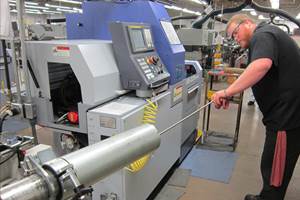Reporting Injuries and Illnesses: On-the-Job Obligation, Not a 'Right'
Paying attention to safety was how we sustained our business, by protecting the health and well-being of our employees.
Reporting of injuries and illnesses is not a right. It is an obligation of the employee to report and a responsibility of the employer to record, investigate and take appropriate remedial actions to retrain as necessary and to remove any hazards identified.
I just finished preparing comments on OSHA’s latest Supplemental Notice of Proposed Rulemaking regarding “Improved Tracking of Workplace Injuries and Illnesses.” In this notice, without actually proposing any regulatory language for employers to review and provide comments, they propose to:
- Require that employers inform their employees of their right to report injuries and illnesses.
- Require that any injury and illness reporting requirements established by the employer be reasonable and not unduly burdensome.
- Prohibit employers from taking adverse action against employees for reporting injuries and illnesses.
The idea that shop managers are somehow trying to discourage reporting of injuries and illnesses is a foreign concept to me. My first supervisory job was as a laboratory supervisor at United States Steel; I can tell you that my first 2 weeks on that job were safety training and shadowing on safety audits. There are many ways to get injured or killed in steel plants where everything is larger, tougher and has more horsepower than a human, not to mention exposure to extremely high temperatures (molten or red hot steel) or in the case of the lab—hazardous acids and toxic chemicals.
Paying attention to safety was how we sustained our business, by protecting the health and well-being of our employees.
In the precision machining shops I visit, owners and managers see safety the same way, as a means to protect their employees and assure that the business is not endangered by consequences of catastrophe. Our precision machining industry has a lower DART rate than our fabricated metals sector, even as we use many of the same processes.
The idea that reporting injuries and illnesses is a “right” is absurd. The OSHA General Duty Clause clearly states that it is an obligation or duty: “Each employee shall comply with occupational safety and health standards, and all rules, regulations and orders issued pursuant to this Act which are applicable to his own actions and conduct.” 29 U.S.C. § 654, 5 (b) (1).
Why is this issue of importance to you and your shop? What if it is a right and not an obligation?
One key issue is that rights may be waivable: that is, one may choose not to exercise their right, for example, to vote, or their Miranda Rights. Rights are different from obligations.
The reason there is an obligation to report is so that the employer can recognize hazardous conditions that contributed to the injury or illness as well as to take corrective actions to eliminate them. Reporting also allows the employer to provide retraining to the injured worker, when needed. If the employee has discretion to not report (since it is their right to report, which implies a right NOT to report), the company may not learn of the hazard. The number of hazards and hazardous conditions in workplaces could proliferate. Reasons why an employee might prefer not to report include embarrassment, not wanting to admit they failed to follow the safe work instructions, desiring to avoid retraining, and so on.
The existing regulations about reporting injuries and illnesses are clear. The duty of employees to report injuries and illnesses is clear. There is no need for OSHA to sow confusion by creating semantic puzzles over obligations versus rights. In the absence of any evidence beyond undocumented anecdotes, the idea that there needs to be further work on injury and illness reporting regulations is ridiculous. “Employers shall comply with occupational safety and health standards promulgated under this Act,” and “Each employee shall comply with occupational safety and health standards, and all rules, regulations and orders issued pursuant to this Act which are applicable to his own actions and conduct,” leave no doubt as to the obligations of all parties.
Reporting injuries and illnesses is not a right. It is an obligation of the employee to report and a responsibility of the employer to record, investigate and take appropriate remedial actions to retrain as necessary and to remove any hazards so identified.
This is why we provided our comments to OSHA on this ridiculous proposal, if we are to maintain safe shops and reduce hazards, everyone (employers and employees) needs to meet their obligations under the OSHA Act. For employees, it’s the duty to report. For employers, it’s the obligation to take corrective action to eliminate hazardous conditions that might be identified by employee injury and illness reporting.
The regulations needed are already on the books. No need to make injury and illness reporting more confusing by calling it a right.
It is a duty. That’s why they call it the General Duty Clause.
You can find the General Duty Clause at: short.productionmachining.com/GenDuty.
Related Content
Gift a 3D Printer to an Employee?
Some shops have purchased inexpensive polymer 3D printers for their operations. Does it make sense to take this a step further and give (or loan) a sharp young employee one to experiment with at home? This small investment could pay off for your shop in different ways.
Read MoreNew Thinking from the New Generation for the New Year
“We have to learn to think in a new way.” –Albert Einstein
Read More6 Tips for Training on a Swiss-Type Lathe
There are nuances to training a person to effectively operate a Swiss-type lathe. A shop I visited a while back offers some suggestions.
Read MoreStrengthening Manufacturing Workplaces Through Active Listening
A good strategy to weather the storms of manufacturing market upheavals and unpredictable factors is to commit to continuous, active employee listening.
Read MoreRead Next
A Tooling Workshop Worth a Visit
Marubeni Citizen-Cincom’s tooling and accessory workshop offers a chance to learn more about ancillary devices that can boost machining efficiency and capability.
Read More5 Aspects of PMTS I Appreciate
The three-day edition of the 2025 Precision Machining Technology Show kicks off at the start of April. I’ll be there, and here are some reasons why.
Read MoreDo You Have Single Points of Failure?
Plans need to be in place before a catastrophic event occurs.
Read More















.jpg;maxWidth=300;quality=90)







